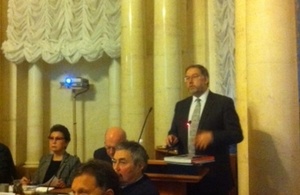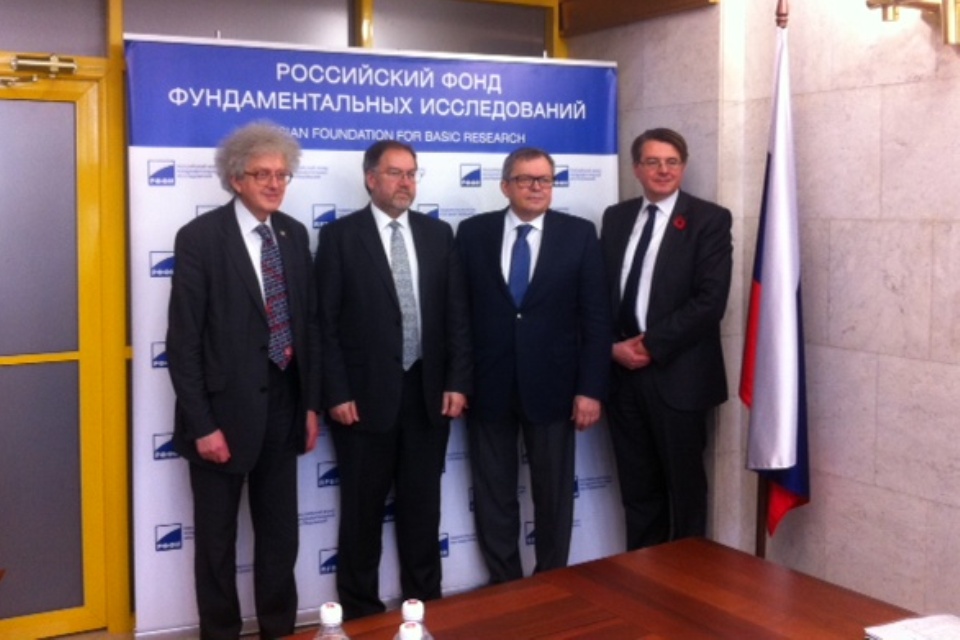FCO CSA Prof.Grimes speaks in Russian Academy of Sciences: Science needs different approaches and expertise
Professor Robin Grimes, the Chief Scientific Adviser for the Foreign Office, had the honour to speak at the Russian Academy of Sciences Presidium on 27 October.

To mark World Science Day for Peace and Development some key themes from the speech are below, focusing on UK/Russia science collaboration, the role science can play to help tackle disasters and the importance of communication between science and government & society.
UK/Russia science collaboration
“From recent research it is also worth noting when the UK and Russia cooperate, the citation of resulting publications is twice the world average. Cooperation with Russia is important for us. I hope this is reciprocal and it will grow further. The question is why are we more productive together? The answer is, we have different thought processes, systems and structures, so when we work together we can pool these different approaches to help solve really difficult problems. I often speak to colleagues within the UK and realise they understand and see things in the same way. What we need is an external view and Russia can provide that. Of course, it is more straightforward to work with people who think the same, it is comfortable. But in the long-run is not as productive and does not lead so readily to the major breakthroughs the world needs. What I want to see is British scientists coming to Russia more often. I arrived in St. Petersburg 25 years ago to visit the University after spending a few weeks at the Latvian State University. My visit, which was funded by an agreement between the Royal Society and the Russian Academy of Sciences, had a strong impact on my career and I remain very grateful for that opportunity. One may say I am partly a product of cooperation between our two countries. So then, personal communications, be those trips to attend conferences or longer time spent carrying out research together remains most important. It binds us together, we develop friendships – all of this is a key to our future joint scientific success”.
Role of science to tackle disasters
“One aspect that continues to be important concerns disasters. From 1990 till 2010 the UK went through a number of national catastrophes which demanded better scientific understanding. As a nation we reflected on these terrible incidents, trying to develop new engineering and scientific methods to solve the relevant problems. It’s clear our ability to respond to risks related to catastrophes is based on the science value chains. For this we must carry out observations to have the possibility to predict, interpret and analyse risks and use this as the basis from which to inform the public. It also allows us to look at the future and give advice on how new catastrophes might be avoided. So, in the UK we now have a structure to ensure scientific evidence is part of the process of dealing with emergencies”.
Challenges of effective science communication
“Scientists want to understand if exploitation of shale gas leads to fresh water pollution, changes in seismic activity or methane release. So what does the public think about this? People are certainly concerned and in many countries citizens have taken to the streets calling for drilling to be stopped. Nevertheless, in general people think exploitation of natural resources should continue, but simply ‘not in my backyard’. People are not specifically concerned with the technical issues, indeed in surveys they are often quite open about not understanding the science detail. What they had developed, however, was deep concern and worry. Clearly we have much to do in order to learn how to speak to people about scientific issues. In 2002 the Science Media Centre was established because as a country we failed to effectively debate the science issues related to the MMR vaccine (mumps, measles and rubella). There was a speculation MMR vaccinations performed on babies contributed to the development of autism. But there were other questions of this kind. Significantly these were the problems that appeared on the front page of all the newspapers but were not treated to evidence based science journalistic debate. Why was this allowed to happen? Because if scientists don’t talk to the media, someone else will in their place. Scientists must offer to talk to the media, though they must be offered training to help them understand how to communicate effectively”.
